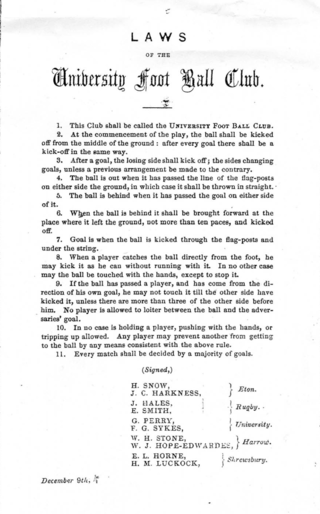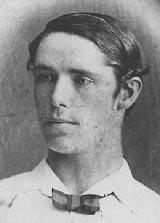Related Research Articles

Offside is one of the laws in association football, codified in Law 11 of the Laws of the Game. The law states that a player is in an offside position if any of their body parts, except the hands and arms, are in the opponents' half of the pitch, and closer to the opponents' goal line than both the ball and the second-last opponent.
1845 in sports describes the year's events in world sport.

The Cambridge Rules were several formulations of the rules of football made at the University of Cambridge during the nineteenth century.
The following are events in the 1850s decade which are relevant to the development of association football. Included are events in closely related codes, such as the Sheffield Rules. All events happened in English football unless specified otherwise.
The following are events in the 1860s decade which are relevant to the development of association football. Included are events in closely related codes, such as the Sheffield Rules. All events happened in English football unless specified otherwise.
The history of association football, more commonly known as football or soccer, stretches back at least to medieval times. Some predecessors of football may date back to ancient Greece and Rome, and similar games were played in ancient China and Japan. The history of football in Britain dates at least to the eighth century CE.

Cuthbert John Ottaway was an English footballer. He was the first captain of the England football team and led his side in the first official international football match.

The 1873 FA Cup final was an association football match between Wanderers F.C. and Oxford University A.F.C. on 29 March 1873 at the Lillie Bridge Grounds in London. It was the second final of the world's oldest football competition, the Football Association Challenge Cup. Unusually, the final kicked-off in the morning to avoid a clash with the annual Oxford-Cambridge Boat Race which was held on the same day. The Wanderers reached the final without playing a match, as the original rules of the competition stated that the holders would receive a bye straight to the final and other teams would compete to gain the other place in the final and challenge them for the trophy. Oxford reached the final when their semi-final opponents, the Scottish club Queen's Park, withdrew from the competition.

The 1874 FA Cup final was a football match between Oxford University and Royal Engineers on 14 March 1874 at Kennington Oval in London. It was the third final of the world's oldest football competition, the Football Association Challenge Cup. Both teams had previously reached the final but been defeated by Wanderers. The Engineers had reached the final with comparative ease, scoring sixteen goals and conceding only one in the four previous rounds. Oxford's opponents in the earlier rounds had included two-time former winners Wanderers.
Robert Walpole Sealy Vidal, who from 1892 was Robert Walpole Sealy was an English 19th century footballer who featured in the first three FA Cup Finals for two different clubs. In March 1870 he played in the first ever international football match, which took place at Kennington Oval, London. He represented England again in 1871.
Clydesdale F.C. was a nineteenth-century Glasgow-based football club, which was attached to Clydesdale Cricket Club.
During the early modern era, pupils, former pupils and teachers at English public schools developed the rules of football, eventually leading to the first written codes of football most notably the Eton College (1815) and Aldenham school (1825) football rules, and rugby football (1845). British public schools football also directly influenced the rules of association football.
The Combination Game was a style of association football based around teamwork and cooperation. It would gradually favour the passing of the ball between players over individual dribbling skills which had been a notable feature of early Association games. It developed from "scientific" football and is considered to be the predecessor of the modern passing game of football. It originated in Britain and its origins are associated with early clubs: Sheffield FC, The Royal Engineers AFC, Queen's Park FC and Cambridge University AFC. Each of these claimants is supported by retrospective accounts from men who were notable in the early history of football. They are considered below in the order of earliest contemporary evidence of "scientific" football playing styles.
The sport of association football has a long history in England.
Passing the ball is a key part of association football. The purpose of passing is to keep possession of the ball by maneuvering it on the ground between different players with the objective of advancing it up the playing field.

This article details the history of football in Scotland.

The 1872 association football match between the national teams of Scotland and England is officially recognised by FIFA as the first international. It took place on 30 November 1872 at Hamilton Crescent, the West of Scotland Cricket Club's ground in Partick, Glasgow. The match was watched by 4,000 spectators and finished as a 0–0 draw.
The 1873–74 Scottish Cup – officially the Scottish Football Association Challenge Cup – was the first season of Scotland's most prestigious football knockout competition. A total of 16 teams from the west of Scotland entered the competition, but only 14 played a match after two teams withdrew. The competition began with a match between Renton and Kilmarnock on 18 October 1873 and concluded with the final on 21 March 1874. After 16 matches and 38 goals, the inaugural cup was won by Queen's Park who defeated fellow Glasgow club Clydesdale 2–0 in the final.

Football is a family of team sports that involve, to varying degrees, kicking a ball to score a goal. Unqualified, the word football generally means the form of football that is the most popular where the word is used. Sports commonly called football include association football ; Australian rules football; Gaelic football; gridiron football ; International rules football; rugby league football; and rugby union football. These various forms of football share, to varying degrees, common origins and are known as "football codes".
The following are events in the 1820s decade which are relevant to the development of football.
References
- 1 2 Richard C. Giulianotti & others (2020). "Football: The Early Years". Encyclopaedia Britannica. Retrieved 18 January 2020.
- 1 2 "History of Football – The Global Growth". FIFA. 2020. Archived from the original on 3 August 2015. Retrieved 18 January 2020.
- ↑ Sanders, p. 28.
- ↑ Sanders, p. 33.
- ↑ "Historical Rugby Milestones 1840s". RugbyFootballHistory.com. 2007. Retrieved 18 January 2020.
- ↑ Sanders, pp. 1–16.
- ↑ Sanders, pp. 32, 41.
- ↑ Sanders, p. 32.